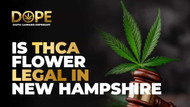Is THCA Legal in New Hampshire?
Jul 7th 2025
As cannabis laws continue to evolve across the United States, many people are becoming curious about the legal status of different cannabis compounds. One such compound that’s been gaining attention recently is THCA (tetrahydrocannabinolic acid). THCA is a non-psychoactive compound found in raw cannabis plants and is known for its potential therapeutic benefits. If you’re in New Hampshire, you might be wondering: Is THCA legal in New Hampshire? In this blog, we will explore the current cannabis laws in New Hampshire and answer this question in detail.
What is THCA?
Before diving into its legal status, let’s first understand what THCA is. THCA is a precursor to THC, the psychoactive compound in marijuana that causes a "high." In its raw form, THCA is non-psychoactive and does not produce the typical effects associated with cannabis consumption. When cannabis is heated or decarboxylated (such as when smoked or vaporized), THCA converts into THC, which then becomes psychoactive.
Due to its non-psychoactive nature, THCA is often used in its raw form in various health and wellness products, such as tinctures, capsules, and even THCA flower. But with cannabis laws being different in every state, it’s important to know the specific regulations surrounding THCA in New Hampshire.
Cannabis Laws in New Hampshire: A Quick Overview
New Hampshire has a complex relationship with cannabis, with specific regulations for medical marijuana but no legal framework for recreational use. Here’s a quick overview of the state’s cannabis laws:
-
Medical Marijuana: New Hampshire legalized medical marijuana in 2013 through the Therapeutic Cannabis Program. The law allows qualified patients with specific medical conditions to obtain and use medical marijuana with a doctor’s recommendation. However, the focus of this program is on THC-rich products and marijuana-derived compounds.
-
Recreational Marijuana: Recreational marijuana use is not legal in New Hampshire. While several states have fully legalized cannabis for adult use, New Hampshire remains one of the states where recreational marijuana is still prohibited.
-
Hemp-Derived Products: New Hampshire follows the Federal Farm Bill (2018), which legalized hemp-derived products containing less than 0.3% THC. This includes products made from hemp that contain non-psychoactive cannabinoids like CBD and THCA.
Is THCA Legal in New Hampshire?
The legality of THCA in New Hampshire largely depends on its source and how it’s used. Let’s break it down:
-
Hemp-Derived THCA:
-
Hemp-derived THCA (with less than 0.3% THC) is legal in New Hampshire, following federal law. This means that THCA products made from hemp, such as tinctures or THCA flower, can be legally purchased, possessed, and used in the state.
-
Since THCA is non-psychoactive in its raw form, it does not produce a high, making it distinct from THC-rich products that are subject to more stringent regulations in New Hampshire.
-
-
Marijuana-Derived THCA:
-
THCA derived from marijuana is subject to the state’s medical cannabis laws. In New Hampshire, only registered medical marijuana patients are allowed to access marijuana-based products, and the use of marijuana for recreational purposes is prohibited.
-
Since THCA is a precursor to THC, marijuana-derived THCA products will likely be regulated under the state’s medical marijuana program and would require a medical marijuana card for purchase and use.
-
-
THCA Flower:
-
The legal status of THCA flower in New Hampshire depends on whether it’s derived from hemp or marijuana. Hemp-derived THCA flower is legal as long as it contains less than 0.3% THC. However, marijuana-derived THCA flower remains subject to New Hampshire’s strict cannabis laws, meaning it’s only legal for medical use.
-
Is THCA Dangerous in New Hampshire?
While THCA itself is not dangerous in New Hampshire, there are some important considerations:
-
Smoking and Health Risks: Whether you’re using THCA products from hemp or marijuana, smoking cannabis of any kind can pose health risks. Smoking releases harmful chemicals that can irritate the lungs and potentially lead to respiratory issues over time.
-
Legal Risks: As New Hampshire has strict cannabis laws regarding recreational use, consuming marijuana-derived THCA products without proper medical authorization could result in legal consequences. However, hemp-derived THCA products are legal under federal law, as long as they comply with THC content restrictions.
What Are the Benefits of THCA?
Many people are turning to THCA for its potential health benefits, especially in its raw form, where it retains its therapeutic properties without causing a high. Some potential benefits of THCA include:
-
Anti-inflammatory effects: THCA may help reduce inflammation, making it a potential treatment for conditions like arthritis or other inflammatory diseases.
-
Neuroprotective properties: Some studies suggest that THCA has the potential to protect brain cells and may even help with neurodegenerative conditions.
-
Antioxidant effects: THCA has shown promise in combating oxidative stress, which is linked to various chronic health conditions.
These benefits are still being researched, but THCA is becoming a popular choice for those seeking the therapeutic effects of cannabis without the psychoactive high.
Conclusion: Is THCA Legal in New Hampshire?
In summary, THCA is legal in New Hampshire if it is hemp-derived and contains less than 0.3% THC, in line with federal law. However, if the THCA is derived from marijuana, it is regulated under New Hampshire’s medical marijuana laws, and only registered patients can legally possess and use it.
If you're considering using THCA for its potential health benefits, make sure to check the source of the product to ensure it complies with state and federal regulations. As always, for specific legal advice, it's recommended to consult with a legal expert in cannabis laws to ensure you remain compliant with New Hampshire's evolving regulations.

